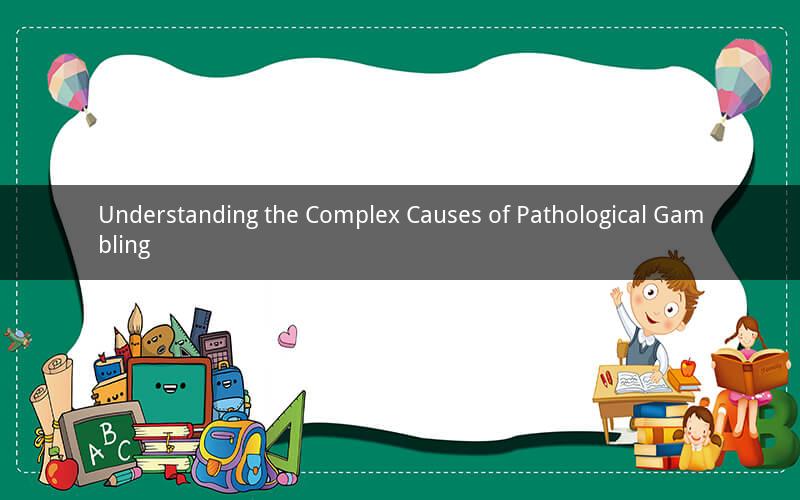
Pathological gambling, also known as gambling addiction, is a condition that affects millions of people worldwide. It is characterized by an inability to control gambling behavior, leading to significant harm in various aspects of life. This article delves into the various factors that contribute to the development of pathological gambling, exploring the psychological, environmental, and genetic influences that play a role in this complex disorder.
1. Psychological Factors
Psychological factors are among the primary causes of pathological gambling. Individuals with certain personality traits, such as impulsivity, thrill-seeking, and a tendency to engage in risky behaviors, are more susceptible to developing gambling addiction. Additionally, individuals with mental health disorders, such as depression, anxiety, and substance abuse issues, may turn to gambling as a form of self-medication or to cope with their emotional distress.
a. Impulsivity: Impulsive individuals often struggle with self-control and may be more prone to engaging in risky behaviors, including gambling. The thrill of taking risks and the immediate rewards associated with winning can be highly appealing to those with impulsive personalities.
b. Thrill-seeking: People who have a strong desire for excitement and new experiences may be drawn to gambling as a way to satisfy their need for thrill. The unpredictable nature of gambling can provide a temporary escape from the monotony of daily life.
c. Mental health disorders: Individuals with mental health issues may turn to gambling as a means of coping with their emotional pain. For some, the excitement and adrenaline rush of gambling can serve as a temporary distraction from their inner turmoil.
2. Environmental Factors
Environmental factors also play a significant role in the development of pathological gambling. The availability of gambling opportunities, exposure to gambling-related stimuli, and social influences can all contribute to the onset and progression of gambling addiction.
a. Availability of gambling opportunities: The proliferation of casinos, online gambling platforms, and lottery games has made gambling more accessible than ever before. Easy access to gambling venues can increase the likelihood of developing gambling addiction.
b. Exposure to gambling-related stimuli: Constant exposure to gambling-related advertisements, promotions, and media portrayals of gambling as a glamorous and exciting activity can create a desire to engage in gambling.
c. Social influences: Peer pressure, family members, or friends who gamble may influence an individual to try gambling themselves. The social aspect of gambling can also contribute to the development of gambling addiction, as individuals may feel compelled to participate in order to fit in.
3. Genetic Factors
Research suggests that genetic factors may also contribute to the development of pathological gambling. Studies have identified specific genes that may be associated with an increased risk of developing gambling addiction. However, it is important to note that genetics alone do not determine whether an individual will develop gambling addiction; environmental and psychological factors also play a significant role.
a. Genetic predisposition: Individuals with a family history of gambling addiction may be at a higher risk of developing the disorder themselves. This suggests that genetics may play a role in the susceptibility to gambling addiction.
b. Genetic markers: Researchers have identified specific genetic markers that may be associated with an increased risk of pathological gambling. These markers can help identify individuals who may be more vulnerable to the disorder.
4. Treatment and Prevention
Understanding the causes of pathological gambling is crucial for developing effective treatment and prevention strategies. Treatment approaches may include cognitive-behavioral therapy, motivational interviewing, and support groups. Prevention efforts can focus on raising awareness about the risks of gambling addiction, promoting responsible gambling practices, and implementing policies to limit access to gambling opportunities.
a. Treatment: Cognitive-behavioral therapy (CBT) is a widely used treatment approach for pathological gambling. CBT helps individuals identify and change the thoughts and behaviors that contribute to their gambling addiction. Motivational interviewing and support groups can also be effective in providing individuals with the tools and support they need to overcome their addiction.
b. Prevention: Public awareness campaigns, responsible gambling initiatives, and policies that limit access to gambling opportunities can help prevent the development of gambling addiction. Educating individuals about the risks of gambling and promoting healthy coping mechanisms can also contribute to prevention efforts.
Frequently Asked Questions
1. What is pathological gambling?
Pathological gambling is a chronic, progressive disorder characterized by an inability to control gambling behavior, leading to significant harm in various aspects of life, such as financial, social, and psychological well-being.
2. Can anyone develop pathological gambling?
Yes, anyone can develop pathological gambling, regardless of age, gender, or socioeconomic status. However, certain factors, such as impulsivity, thrill-seeking, and a family history of gambling addiction, may increase an individual's risk.
3. Is pathological gambling a mental health disorder?
Yes, pathological gambling is recognized as a mental health disorder by the American Psychiatric Association (APA) and the World Health Organization (WHO). It is classified under the category of addictive disorders.
4. Can pathological gambling be treated?
Yes, pathological gambling can be treated effectively. Treatment approaches may include cognitive-behavioral therapy, motivational interviewing, and support groups. The key to successful treatment is identifying the underlying causes of the addiction and developing a personalized treatment plan.
5. How can I prevent pathological gambling?
To prevent pathological gambling, it is important to be aware of the risks associated with gambling and to adopt responsible gambling practices. This includes setting limits on the amount of money and time spent gambling, avoiding gambling when feeling stressed or emotional, and seeking help if you suspect you may have a gambling problem.